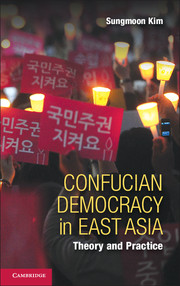Book contents
- Frontmatter
- Dedication
- Contents
- Acknowledgments
- Introduction
- Part I Beyond Thick Confucian Communitarianism and Meritocratic Elitism
- Part II Confucian Democracy in Theory – A Pluralist Reconstruction
- Part III Confucian Democracy in Practice – The Korean Case
- 8 Motivating and Legitimating Confucian Democracy: The Politics of Chŏng
- 9 Confucian Public Reason and the Liberalism of Human Rights
- 10 Confucian Civility and Expressive Liberty
- 11 Confucianizing Multiculturalism
- Bibliography
- Index
- References
8 - Motivating and Legitimating Confucian Democracy: The Politics of Chŏng
Published online by Cambridge University Press: 05 June 2014
- Frontmatter
- Dedication
- Contents
- Acknowledgments
- Introduction
- Part I Beyond Thick Confucian Communitarianism and Meritocratic Elitism
- Part II Confucian Democracy in Theory – A Pluralist Reconstruction
- Part III Confucian Democracy in Practice – The Korean Case
- 8 Motivating and Legitimating Confucian Democracy: The Politics of Chŏng
- 9 Confucian Public Reason and the Liberalism of Human Rights
- 10 Confucian Civility and Expressive Liberty
- 11 Confucianizing Multiculturalism
- Bibliography
- Index
- References
Summary
If there is one thing that can tellingly distinguish Korean democracy from postcommunist democracies in Eastern and Central Europe, it is to be sure the extraordinary vibrancy of civil society in democratized Korea. It is literally “extraordinary,” because, among Western observers, it has been constantly reported that there is a salient contrast between a plethora of political actions and civil movements in democratizing postcommunist countries and a frustrating paucity of civic engagement in their democratized counterparts. Considering the similar transitional experience – which political scientist Terry Karl termed a “mass-ascendant” mode of democratization – in which “ethical civil society” played a pivotal role in breaking down the (postcommunist or pseudo-democratic) bureaucratic authoritarian regime, the contrast in the viability of civil society between democratized Korea and its Eastern and Central European counterparts is quite remarkable.
For most comparative political scientists, the most eminent question has been, “Why such a sudden disappearance of civic energy in postcommunist Europe?” Most often, the inertial lifestyle that the previous rigid party-state has engendered over the past half century has been singled out as the most crucial source of the problem. That is, blame is placed on the citizenry’s fundamental dependence on the party-state for virtually everything concerning their life: jobs, income, consumer goods, education, housing, health care, and social and geographic mobility. According to Marc Howard, a lack of desire to participate in voluntary organizations in the postcommunist people follows from their past life experience under the ossified bureaucratic authoritarian regime that had widened the gap between authentic private and hypocritical public lives, deepened the mistrust of formal political organizations, and fostered friendship networks in the private sphere.
- Type
- Chapter
- Information
- Confucian Democracy in East AsiaTheory and Practice, pp. 205 - 226Publisher: Cambridge University PressPrint publication year: 2014



